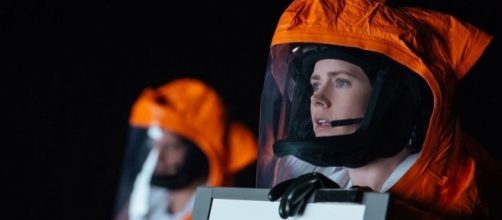For the majority of both regular and casual cinemagoers, I think it is safe to say that Denis Villeneuve’s Arrival was phenomenal. Regardless of its highly cerebral nature, Arrival has a central message, simple and subtle, of appreciating every moment of our lives, even though we all know the ultimate outcome. It is this philosophy, explored through clever narrative twists, that really makes the Film profound. In the time of the impending La La La release, and with Rogue One exploding into cinemas, let us not forget this masterpiece before the year is out.
Keeping the Pace Slow
Perhaps the most prudent characteristic of Arrival’s style is its slow pace. This is an obvious difference other modern mainstream films this year in the sense that instead of the extensive and explosive action sequences, such as those from Jason Bourne or Independence Day: Resurgence, Arrival develops a slow-burning style which allows for an intensive watch; not once relying on heavy computer graphics or predicable fight scenes against the aliens – and this is very refreshing to watch. This smoothness yields the ultimate focus of the story, which is of Amy Adam’s Louise Banks. In one sense, it is almost as if the slow pace of the film reflects Bank’s personal narrative and how, from her perspective, time is a tad slower, with no real direction in her life to motivate her to move faster.
At least until the arrival of her daughter, Hannah.
Having the Clever Hat On
Evidently, Arrival is a story that depends on its scientific exploration and fact. On the surface, to some that may sound incredibly boring, but Arrival does a sensational job of bringing interesting theories, unknown to the audience, and exploring them through human endeavour and nature.
Take the central Sapir-Whorph hypothesis as one example. The idea of immersing yourself in a foreign language and how that can possibly re-wire your brain is easily graspable, but taken to a new level in the film by the omnipresent re-wiring of Bank’s brain as she learns the Heptapod’s time-ascending language. However, it is the impact of the use of this hypothesis that makes the ultimate message excel – by re-wiring her brain to view time from a non-linear perspective, Banks can now choose how to live her life, she has that choice.
This is not only beautiful storytelling in my opinion, but magnificent use of the sci-genre, something really special that hasn’t really been touched upon by other sci-fi films this year.
The Human Heart of the Story
With Amy Adams and Jeremy Renner both very present in comic book franchises as Lois Lane and Hawkeye, I feel it somewhat ironic that they end up in a sci-fi where the real superpower is your life, and time, and most importantly how you use it. The toned down, more realistic suspense matches their performances. Amy Adams won’t win an Oscar for her performance, but her ability to play a character who is, at the end of the day, experiencing her whole life flash in front of her, and demonstrate this in a perfectly subtle way, with added nuances - it's astonishing.
It is this reflective, yet rather deep and juicy performance, that really strengthens her character, and upholds the sometimes powerful emotion in the film.
Overall, Arrival has got to be one of the greatest science fiction pieces of recent years. By no means the film perfect; I have to say I would have much preferred a more prominent, powerful soundtrack. However, like I said when I left the cinema that night, Arrival doesn’t need the typical conventions of modern day films like a booming soundtrack: it reverses every subconscious crave that the audience may have for a film in 2016, and that’s what makes it different, refreshing, and a thoroughly brilliant cinema experience. Again, I questioned this when I finished the film – is Arrival my new favourite film?

